Czechs deploy wild horses from Britain to save biodiversity
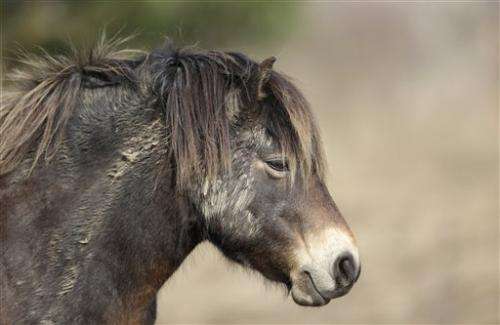
Twenty-five years ago it was a military zone where occupying Soviet troops held exercises. Today it's a sanctuary inhabited by wild animals that scientists hope will improve biodiversity among local plants as well as save endangered species.
A herd of 14 wild mares from Britain's Exmoor National Park were moved in January to the former Milovice military base, 35 kilometers (22 miles) northeast of Prague, the Czech capital.
After an acclimatization period at a small enclosure, the horses were released Saturday to a 40-hectare (99-acre) area. Their task is to stop the spread of aggressive and evasive grasses—including bushgrass—that are delicacies for them. The invasive plants began to grow after Soviet troops withdrew in 1991, threatening the area's original plants and animals. A stallion will join the mares in April.
Dalibor Dostal, director of European Wildlife, the organization behind the project, said scientists decided that using big-hoofed animals such wild horses, which "maintained the steppe character of nature across Europe for thousands of years," could solve the invasive plant problem in the most effective way. That should also help some 30 threatened species in the area, including the Mountain Alcon Blue butterfly and the Star Gentian flowering plant.
"Alternatives to wild animals are very expensive and their impact on the environment is not very good," Dostal said.
Domestic animals such as sheep were ruled out because they would feed on the endangered plants, and mechanical cutting costs too much.
"(The horses) will move freely on the pastures the whole year. If they have a source of water and enough space, they don't need any care. They are able to care of themselves," Dostal said.
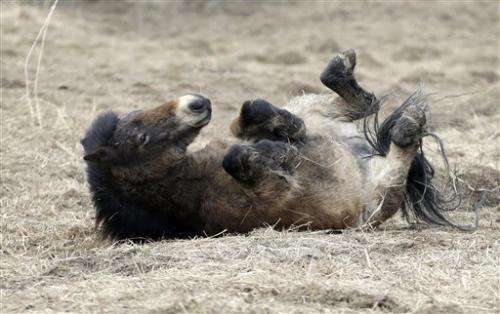
Environmentalists are already planning to expand the territory and use other big-hoofed animals such as European bison.
The Soviet army that stayed after the 1968 Soviet-led invasion of then-Czechoslovakia was the last armed force in the area. Dostal said the soldiers' activities actually simulated the impact of hoofed animals, a reason why "military zones in the Czech Republic are the places with the best biodiversity."
-
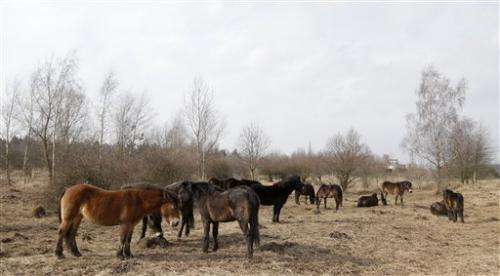
In this photo taken on Monday, March 16, 2015, a herd of 14 wild mares from Britain's Exmoor National Park rest in an enclosure near the village of Milovice, Czech Republic. Twenty-five years ago it was a military zone where occupying Soviet troops held exercises. Today it's a sanctuary inhabited by wild animals that scientists hope will improve biodiversity among local plants as well as save endangered species. (AP Photo/Petr David Josek) -
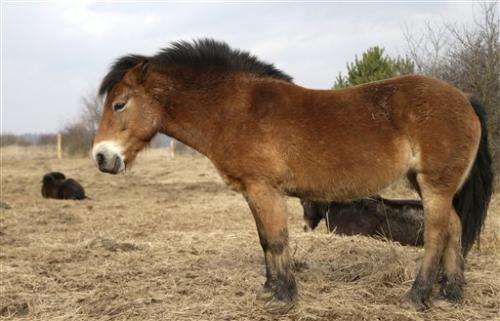
In this photo taken on Monday, March 16, 2015, some of the 14 wild mares from Britain's Exmoor National Park rest in an enclosure near the village of Milovice, Czech Republic. Twenty-five years ago it was a military zone where occupying Soviet troops held exercises. Today it's a sanctuary inhabited by wild animals that scientists hope will improve biodiversity among local plants as well as save endangered species. (AP Photo/Petr David Josek) -
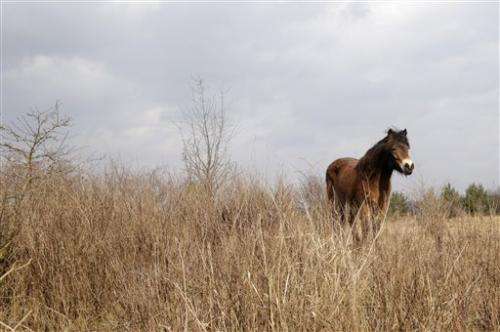
In this photo taken on Monday, March 16, 2015, one of the 14 wild mares from Britain's Exmoor National Park rests in an enclosure near the village of Milovice, Czech Republic. Twenty-five years ago it was a military zone where occupying Soviet troops held exercises. Today it's a sanctuary inhabited by wild animals that scientists hope will improve biodiversity among local plants as well as save endangered species. (AP Photo/Petr David Josek) -
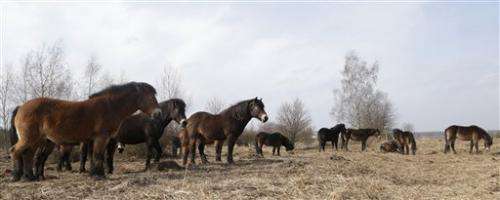
In this photo taken on Monday, March 16, 2015, a herd of 14 wild mares from Britain's Exmoor National Park rest in an enclosure near the village of Milovice, Czech Republic. Twenty-five years ago it was a military zone where occupying Soviet troops held exercises. Today it's a sanctuary inhabited by wild animals that scientists hope will improve biodiversity among local plants as well as save endangered species. (AP Photo/Petr David Josek)
© 2015 The Associated Press. All rights reserved.



















